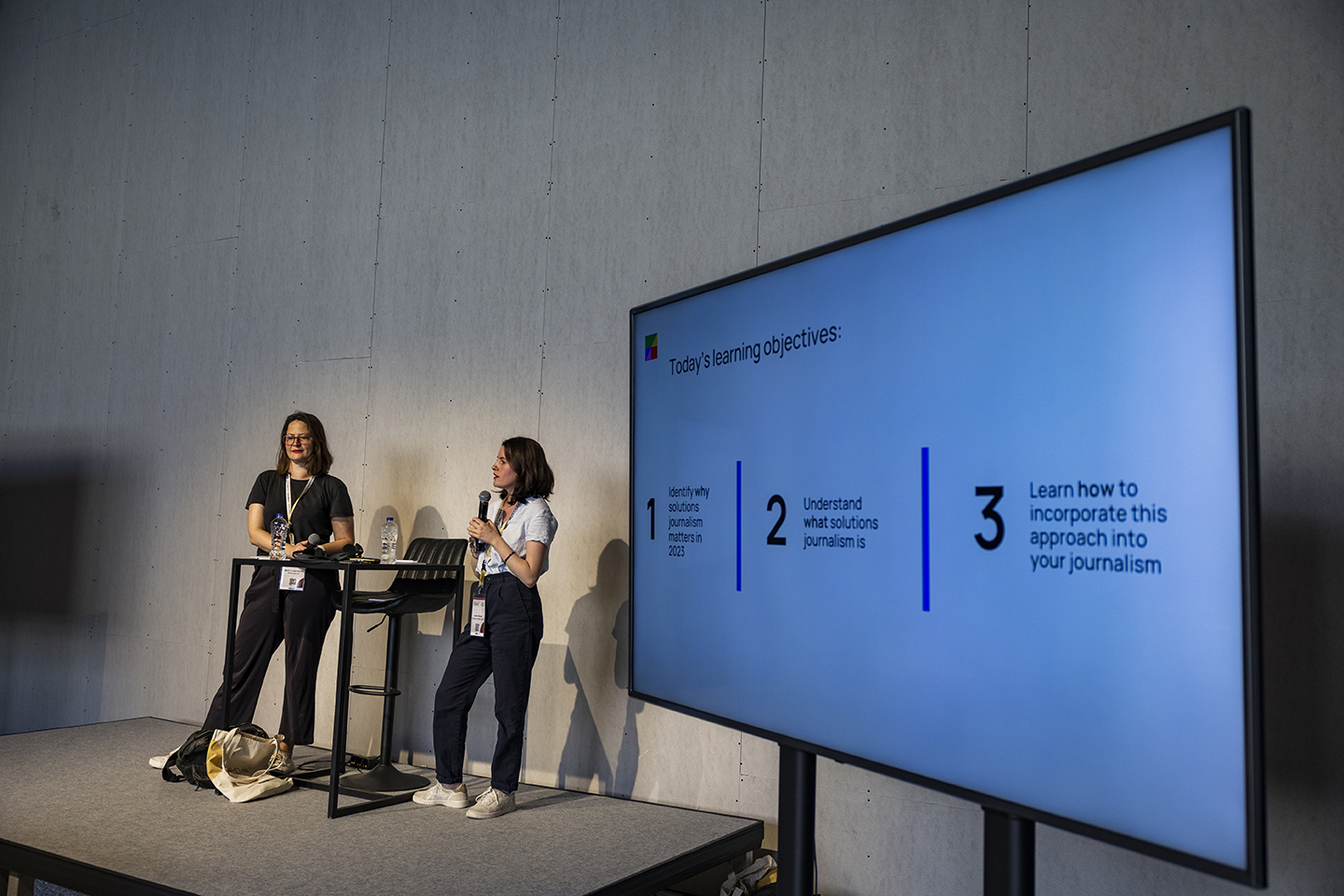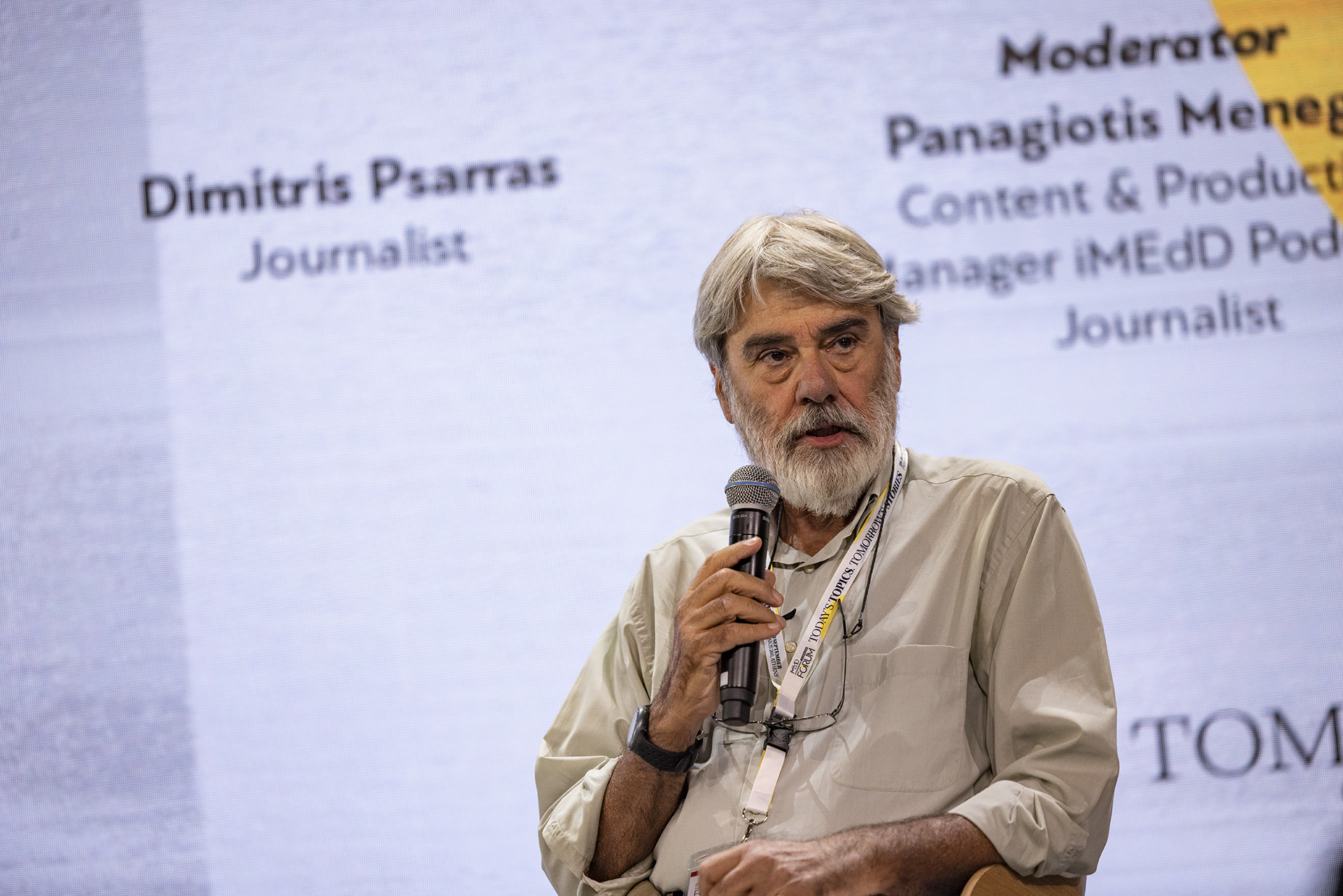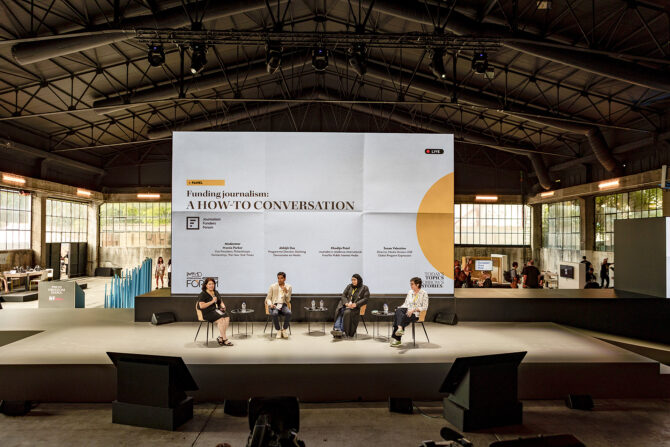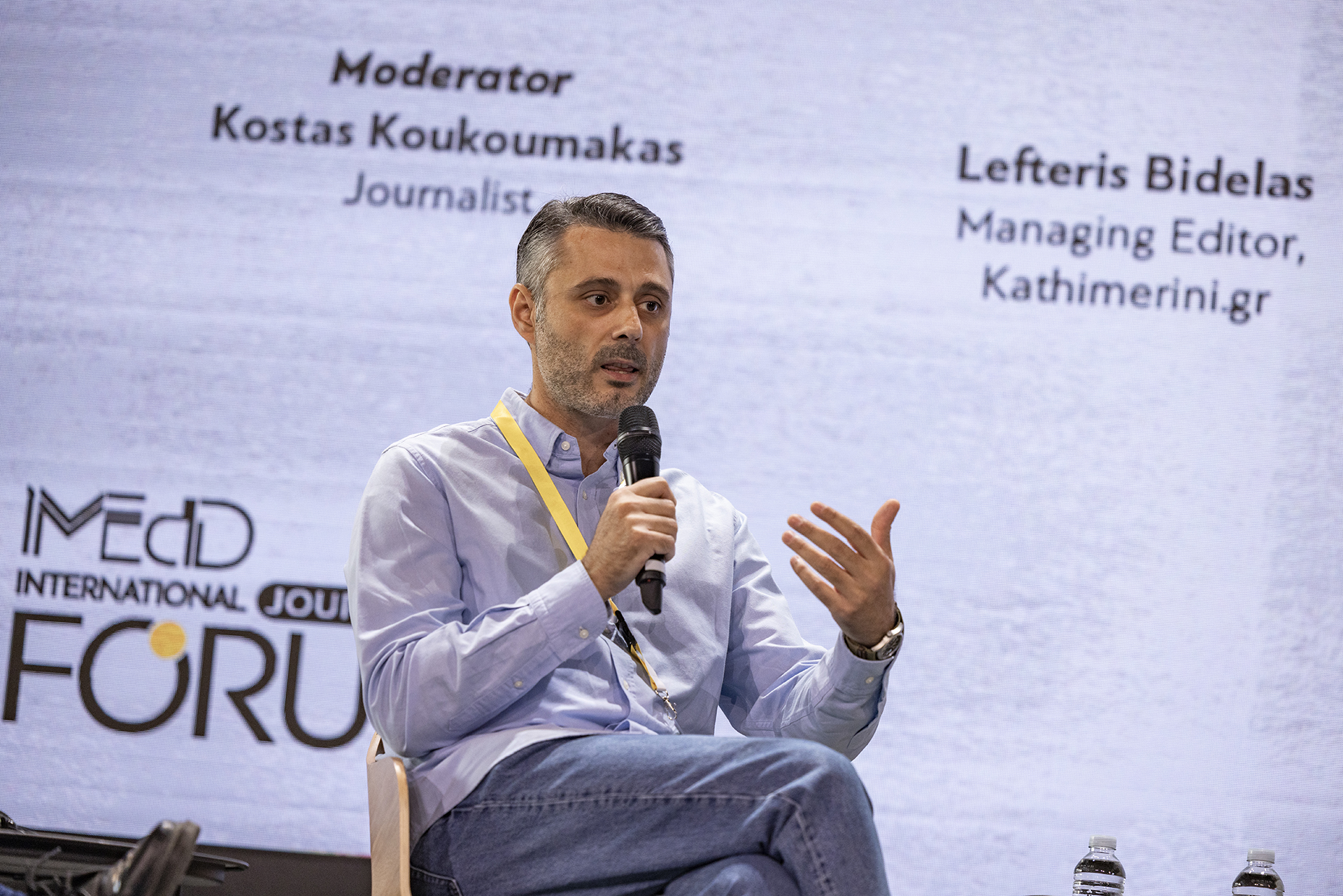Exposing or ignoring? Dimitris Psarras and Lefteris Bidelas discuss the electoral surge of the far-right, the characteristics of this political sphere and the journalistic coverage of the phenomenon.
In the June 2023 Greek parliamentary elections, three political parties associated with the extreme right secured seats in the Greek Parliament. According to Ministry of Interior data, the “Spartans”, “Greek Solution”, and “Victory” collectively amassed over 650,000 votes.
The electoral success of this political realm was one of the topics discussed during the panel titled “We need to talk about the far-right, but how?” held as part of the iMEdD International Journalism Forum from September 28 to 30, 2023, in Athens. Moderated by journalists Panagiotis Menegos and Kostas Koukoumakas, the panel featured journalists Dimitris Psarras, Lefteris Bidelas, Flora Garamvolgyi and Antoine Malo.
Following the discussion, Dimitris Psarras, a journalist at “Efimerida ton Syntakton” (Newspaper of the Editors), and Lefteris Bidelas, Managing Editor at Kathimerini.gr, shared their perspectives with iMEdD on the rise of the far-right in Greece, as well as the characteristics and journalistic coverage of this phenomenon.
Good news, bad news, and the solution

How can journalists avoid the good news trap, be part of the solution in a problem-focused industry, and distinguish their content from traditional media outlets? Juliette Gerbais talks with iMEdD about Solutions Journalism and the quest for answers to present challenges.
The transformation of the far-right
“It is indeed a reality that today, the far-right is marked by fundamental changes compared to the Golden Dawn era”, says Dimitris Psarras, who has written a number of articles and books on Golden Dawn and the far-right in Greece. Golden Dawn was characterised by a hierarchical structure centred around its leader. “Presently, we observe somewhat more diffuse patterns. There’s a nod to a leader, as evident in the case of the Spartans with Ilias Kasidiaris, but the members themselves—be they “Spartans”, “Greeks”, or affiliated with any other organisation – are essentially extras in a one-man show. The current structure has not yet solidified into a formation with a cohesive core, like the one Michaloliakos had established. But I don’t rule out the possibility of such a transformation in the future”, he adds.

Lefteris Bidelas, whose revelatory reporting exposed the criminal face of Golden Dawn both prior to and after the murder of Pavlos Fyssas on September 18, 2013, also identifies disparities between Golden Dawn and the far-right groups active today. He emphasises that the current phenomenon in Greece aligns with the European extreme right, featuring a strong anti-immigrant, racist, and anti-minority discourse, with the role of religion as a major factor—an “elevation of the triptych Fatherland – Religion – Family”, (Translator’s Note: Traditional Greek slogan appropriated by the military junta that ruled Greece between 1967 and 1974) as he says. According to Bidelas, a significant qualitative difference is also present in the way this discourse is materialised. “Today we don’t witness assault battalions marching in the streets, nor do we experience violent outbursts and attacks against foreigners. In other words, this discourse has not translated into action; it remains at the level of rhetoric”. He also notes that electorally, despite nearly identical percentages, the far-right displayed fragmentation in the 2023 elections, with votes divided among three parties. Conversely, Golden Dawn had successfully expressed this ideological space in a unified manner in previous elections.
It is indeed a reality that today, the far-right is marked by fundamental changes compared to the Golden Dawn era
Dimitris Psarras, Journalist
Sustainable journalism: Practical steps to fund your work

In the contemporary world, journalism is more necessary than ever. However, what happens when journalists and newsrooms face funding problems?
Journalistic coverage of the phenomenon
Dimitris Psarras has been covering the far right since the early 1980s. He wrote on and researched Golden Dawn long before it gained public recognition, causing a stir in the political landscape during the 2012 elections with its entrance into the Greek Parliament. According to him, it’s crucial for journalists to probe far-right entities, even when they operate outside the parliamentary sphere. “When a far-right formation is active, not merely a group gathering in a basement expressing their opinions, journalists should investigate it even before it enters parliament”, he tells iMEdD, adding that if the democratic political system had heeded warnings from journalists and some politicians about Golden Dawn as early as the late 1990s, the phenomenon would have been handled differently, leading to a distinct impact.
It is our duty to prevent waking up one day to yet another political assassination
Lefteris Bidelas, Managing Editor, Kathimerini.gr
For Lefteris Bidelas, it is important for journalists investigating the far-right to ensure the accuracy of their information and verify the facts to avoid the need for apologies or retractions in their reporting. If such retractions occur, as Bidelas points out, there’s a potential risk of undermining not only future revelations on the matter, but also of inadvertently fueling the far-right rhetoric and propaganda itself. “We have to carefully select what, when and with whom we publish, because it is easy to fall into a trap. Such missteps could undermine both the impact of our reporting and the medium in which we work, hindering broader efforts that may be made at the time against specific propaganda”, he notes. Regarding journalists’ attitude towards far-right propaganda and fake news, Bidelas is clear: “All misinformation from these parties has a target. It is our job to discern its aim, not merely react to fake news, but to stay ahead of the propaganda strategies employed by each far-right party”.

Both journalists emphasised the importance of journalists being vigilant on the issue of the far-right to avoid encountering dangerous situations reminiscent of the recent past. “We are witnessing phenomena that, currently, we cannot link to specific parties. Certain violent or even criminal incidents in major cities may lack direct connections, but we cannot rule out the possibility that the perpetrators are drawing inspiration from existing parliamentary affiliations”, Dimitris Psarras observed, while Lefteris Bidelas concluded: “It is our duty to prevent waking up one day to yet another political assassination”.
Watch the panel discussion “We need to talk about the far-right, but how?” featuring journalists Dimitris Psarras and Lefteris Bidelas, as part of the iMEdD International Journalism Forum below:
